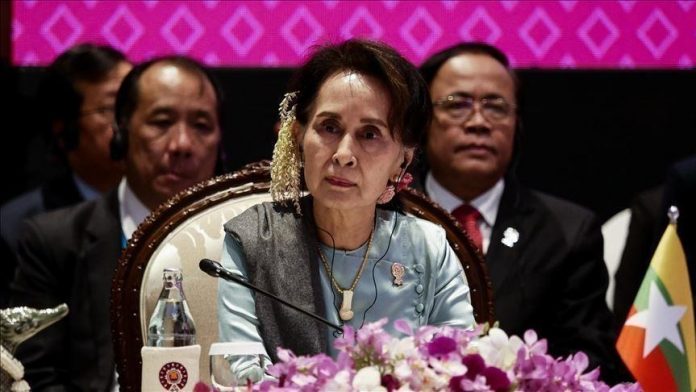According to local media on Thursday, a military junta court in Myanmar sentenced former leader Aung San Suu Kyi and her Australian economic adviser to three years in prison on charges of violating the official secret act.
After 18 months of hearings, the Pyinmana District Court found Suu Kyi and Australian professor Sean Turnell guilty of violating the official secret act, according to the local news source Myanmar Now.
On the same charges, the court also imposed the same prison term on former members of Suu Kyi’s cabinet, including the finance minister Kyaw Win, his replacement Soe Win, and the deputy minister Set Aung.
Suu Kyi was found guilty of election fraud earlier this month and given a three-year prison term by a military tribunal.
Since the military overthrew her government in February of last year, Suu Kyi has been facing charges that could result in a sentence of 23 years in prison.
The military government transferred her to a prison in June and put her in solitary confinement.
Suu Kyi was placed under house arrest following her overthrow by the military on February 24, 2021, and remained there until April of this year, when she was transferred to what is thought to be Naypyitaw Prison in the capital of Myanmar.
She is being held accountable for more than a dozen offences, including corruption, for which she was sentenced to five years in prison in April.
In the past, Suu Kyi spent roughly 15 years under house arrest in the nation with a majority of Buddhists under various junta regimes.
Since 2009, Suu Kyi has spent a second time behind bars. She had been transferred to Yangon’s Insein Prison earlier that year for “violating the rules of her house arrest” for a period of four months.
Following its victory in the national elections held in November 2020, Suu Kyi’s government was overthrown by the military in a coup last year.
Widespread civil unrest followed the coup as citizens protested her removal and military rule. Despite UN warnings that the country had entered a civil war, the junta violently put down protests.
According to a regional monitoring organisation called the Assistance Association for Political Prisoners, the junta forces have since killed more than 1,500 people in a crackdown on dissent.

